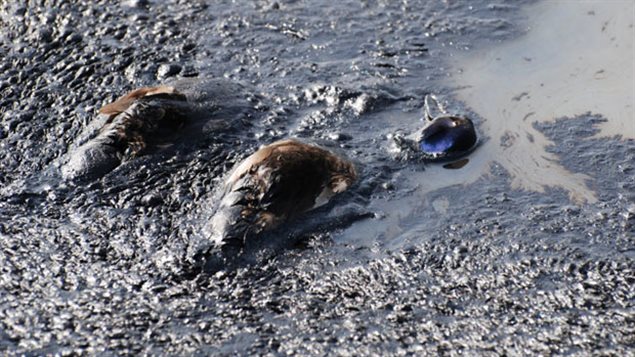Greenpeace Canada is calling for a full investigation into bird deaths at an oilsands tailings pond in the western province of Alberta. Petroleum companies extract oil from bitumen leaving behind ponds of toxic materials that can be as large as 130 square kilometers.
In 2008, Syncrude was fined $3 million for allowing 1,600 ducks to perish on tailings ponds. Since then, companies have adopted measures to try to keep birds away.
At least 94 birds died
But Greenpeace has learned of an incident where it appears measures failed and at least 94 birds died at a tailings pond owned by Canadian Natural Resources Limited (CNRL) in November of 2014.
“We got the actual investigator’s report’s handwritten notes from the summaries that he sent to his bosses,” says Keith Stewart, head of the climate and energy campaign at Greenpeace Canada. “But his bosses, when they wrote up the memo, they said all of the companies had fully functioning bird deterrent systems. Since these systems were all working 100 per cent, there’s no need to investigate any further. Well that clearly didn’t seem to be the case.”
ListenSeveral deterrents appear to have failed
The documents suggest that one of the long-range acoustical devices to scare birds away was not working at the time of the incident, CNRL had removed 25 of the 100 deterrents in the area, a boom to contain oil had been removed earlier than usual and there were lights that shone on the pond and that would have attracted birds.
The documents also note that beside the dead birds found at the pond, over 400 were sighted on it and may have flown away and died later from exposure to the toxic substances.
Law appears to not have been enforced
Based on these documents, Greenpeace sent a letter to the province asking why there wasn’t a more thorough investigation and why Alberta’s laws protecting wildlife are not being enforced. “Either the company broke the rules or the rules are so weak that you need stronger rules,” says Stewart.
“We think this requires investigation. Alberta can’t claim to have… this world class environmental regulatory system…If companies don’t follow the rules then they should be charged and in this case it looks to us like that didn’t happen.”








For reasons beyond our control, and for an undetermined period of time, our comment section is now closed. However, our social networks remain open to your contributions.